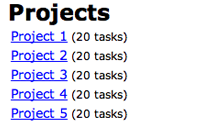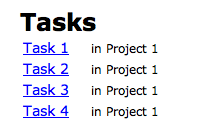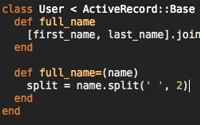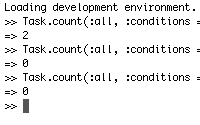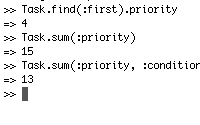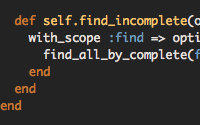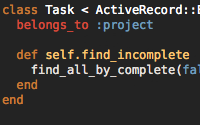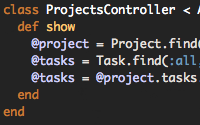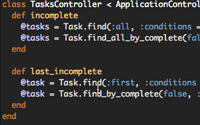Categories
- Active Record
- Active Resource
- Active Support
- Administration
- Ajax
- APIs
- Authentication
- Authorization
- Background Jobs
- Caching
- Code Walkthrough
- Controllers
- Debugging
- Deployment
- eCommerce
- Forms
- Mailing
- Models
- Performance
- Plugins
- Production
- Rack
- Rails 2.0
- Rails 2.1
- Rails 2.2
- Rails 2.3
- Rails 3.0
- Rails 3.1
- Rails 3.2
- Rails 4.0
- Refactoring
- Routing
- Search
- Security
- Testing
- Tools
- Views
Applied Filters:
Active Record x
Counter Cache Column
If you need to display the record count for a has_many association, you can improve performance by caching that number in a column.
(7 minutes)
Eager Loading
One way to improve performance is to cut down on the number of SQL queries. You can do this through eager loading. Learn all about it in this episode!
(4 minutes)
Virtual Attributes
Keep your controllers clean and forms flexible by adding virtual attributes to your model. This very powerful technique allows you to create form fields which may not directly relate to the database.
(3 minutes)
Fun with Find Conditions
You can pass more than simple strings to find conditions. Arrays, ranges, and nil values can be passed as well. In this episode you will see the tricks involved with passing these odd objects to find conditions. (Update: audio fixed).
(4 minutes)
Performing Calculations on Models
Did you know ActiveRecord provides class methods for performing calculations on models? You can even use these methods through associations.
(2 minutes)
Using with_scope
Learn how to use with_scope - a very powerful method which will allow your custom find methods to accept any find options. Just like magic!
(2 minutes)
Move Find into Model
Move a find into the model to clean up the controllers and remove duplication. Also see how you can call these custom find methods through an association.
(2 minutes)
Find Through Association
No need to pass foreign keys in find conditions, just do the find through a has_many association.
(2 minutes)
Dynamic find_by Methods
Shorten simple finds considerably and improve readability by using the dynamic find_all_by and find_by methods.
(1 minute)

